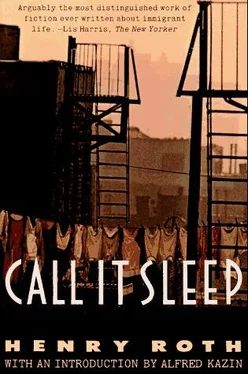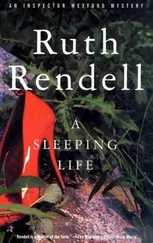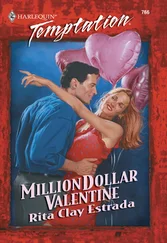“Mama!” he moaned, peering down, “Mama!”
He dipped his foot into night, feeling for the stair, found it, pulled the door shut behind him. Another step. He clung to the wall. A third. The unseen strands of a spider’s web yielded against his lip. He recoiled in loathing, spat out the withered taste. No further. No! No further. He was trembling so, he could barely stand. Another step and he would fall. Weakly, he sat down.
Darkness all about him now, entire and fathomless night. No single ray threaded it, no flake of light drifted through. From the impenetrable depths below, the dull marshy stench of surreptitious decay uncurled against his nostrils. There was no silence here, but if he dared to listen, he could hear tappings and creakings, patterings and whispers, all furtive, all malign. It was horrible, the dark. The rats lived there, the hordes of nightmare, the wobbly faces, the crawling and misshapen things.
XII
HE GRITTED his teeth with the strain. Minutes had passed while he willed in a rigid pounding trance — willed that Luter would come down, willed that Luter would leave his mother. But on the stairs outside the cellar door all was still as before. Not a voice, not a footstep could he conjure out of the silence. Exhausted, he slumped back against the edge of the stair. But his ears had sharpened. He could hear sounds that he couldn’t hear before. But not above him now — below him. Against his will he sifted the nether dark. It was moving — moving everywhere on a thousand feet. The stealthy horrible dark was climbing the cellar stairs, climbing toward him. He could feel its ghastly emanation wreathing about him in ragged tentacles. Nearer. The foul warmth of its breath. Nearer. The bloated grisly faces. His jaws began to chatter. Icy horror swept up and down his spine like a finger scratching a comb. His flesh flowed with terror.
— Run! Run!
He clawed his way up the gritty stairs, fumbled screaming for the doorknob. He found it, burst out with a sob of deliverance and flung himself at the light of the doorway.
— Out! Out! Before any body comes.
Down the stoop and running.
— No! That way, school! That house! Other way!
At the corner, he swerved toward the right toward less familiar streets.
— Light! Light in the streets! Could see now. Could look … Man there … No policeman … No one chasing … Could walk now.
The keen, cold-scented air revived him, filtered through his coat, quickening the flesh beneath. The swift and brittle light on corners and upper stories comforted him. Things were again steadfast and plain. With each quick breath he took, a hoop of terror snapped from his chest. He stopped running, dropped into a panting walk.
— Could stay here now … No one chasing … Could stay, could go … Next block, what?
He turned a corner and entered a street much like his own — brick houses and wooden houses — but no stores.
— Want different one … Could go next.…
At the next corner he stopped with a cry of delight and gazed about him. Telegraph poles! Why hadn’t he come here before? On each side of the street, they stretched away, the wires on their crosses swinging into the sky. The street was wide, divided by a seamed and frozen mudgutter. At one end, the houses thinned out, faltering into open fields. The weathered poles crowded up the hill of distance into a sheen of frayed cloud. He laughed, filling his eyes with dappled reach, his lungs with heady openness.
— They go way and away … Way, way, way.… Could follow.
He patted the stout wooden pillar near his hand, examined the knots, darker than the grey, thrust at its patient bulk and laughed again.
— Next one.… Race him!.. Hello Mr. High Wood.… Good-bye, Mr. High Wood. I can go faster.… Hello, Second Mr. High Wood.… Good-bye Second Mr. High Wood … Can beat you …
They dropped behind him. Three.… Four.… Five … Six.… drew near, floated by in silence like tall masts. Seven.… Eight.… Nine … Ten.… He stopped counting them. And with them, dwindling in the past, all he feared, all he loathed and fled from: Luter, Annie, the cellar, the boy on the ground. He remembered them still, yes, but they were tiny now, little pictures in his head that no longer writhed into his thoughts and stung him, but stood remote and harmless — something heard about someone else. He felt as if they would vanish from his mind altogether, could he only reach the top of that hill up which all the poles were striding. He hurried on, skipping sometimes out of sheer deliverance, sometimes waving at a laggard pole, gurgling to himself, giggling at himself, absurdly weary.
And now the houses straggled, giving way to long stretches of empty lots. On either side of the street, splotches of yeasty snow still plastered the matted fields. On ledges above the rocks, the black talons of crooked trees clawed at the slippery ground. At the doorway of a chicken coop, behind a weathered, ramshackle house, a rooster clucked and gawked and strutted in. The level sidewalks had ended long ago; the grey slabs underfoot were cracked and rugged, and even these were petering out. A sharp wind was rising across the open lots, catching up cloaks of dust, golden in the slanting sun. It was growing colder and lonelier, the wintry bleakness of the hour before sunset, the earth contracting, waiting for night—
— Time to look back.
— No.
— Time to look back.
— Only to the end of that hill. There where the clouds fell.
— Time to look back.
He glanced over his shoulder and suddenly halted in surprise. Behind him as well as before, the tall spars were climbing into the sky.
— Funny. Both ways.
He turned about, gazing now behind him, now before.
— Like it was a swing. Didn’t know.
His mood was buckling.
— Same. Didn’t know.
His legs were growing tired.
— It’s far away on the other side.
Between coat-pocket and sleeve one wrist was cold, the other was throbbing.
— And it’s far away on the other side.
The tubers of pain under the skin of his shoulders were groping into consciousness now.
— And it’s just the same.
Slowly, he began retracing his steps.
— Can go back.
Despite growing weariness, he quickened his pace.
They were all gone now, Luter was gone; they had finished that game. He and his mother. Could go back now. And the policeman was gone, couldn’t find him. Could go back. And his mother would be there, yes, waiting for him. Didn’t hate her now. Where were you? she would ask. No place. You frightened me; I couldn’t find you. Wouldn’t say. Why don’t you tell me where you were? Because. Why? Because — But must get back before his father came. Better hurry.
Houses were gathering together again.
And I looked out of the window, and I called, David, David, and I couldn’t find you. Wouldn’t tell her. Maybe she even went down stairs into the street. But if the policeman told her. She wouldn’t tell his father. No. When he got into his street, he’d call her. She’d look out of the window. What? Wait in the hall, I’m coming upstairs. She’d wait and he’d run past the cellar. Hate it! Wish there were houses without cellars.
The sky was narrowing; houses had closed their ranks. Overhead, a small flock of sparrows, beading the wires between two telegraph poles, tweaked the single dry string of their voices. On the railing of a porch, a grey cat stopped licking a paw and studied them gravely, then eyed David as he passed.
Milk-supper, maybe, when he came upstairs. Sour cream, yum! Break pieces of bread into it. Sour cream with farmer-cheese. Mmm! Sour cream with eggs. Sour cream with what else? Borscht … Strawberries.… Radishes … Bananas … Borscht, strawberries, radishes, bananas. Borscht, strawberries, apples and strudel. No. They didn’t eat with sour cream. Sour. Cream. Sour. Cream. Like it, like it, like it. I — like — it. I like cake but I don’t like herring. I like cake, but I don’t like what? I like cake, but I don’t like, like, like, herring. I don’t don’t — How far was it still?
Читать дальше












